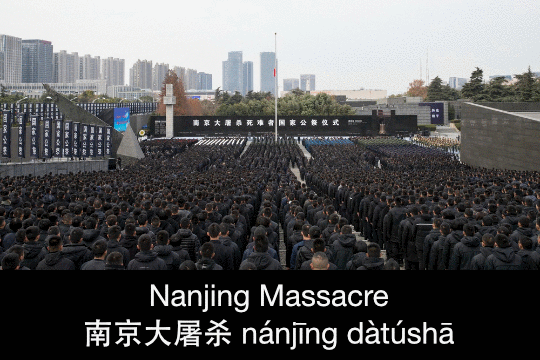Remembering Nanjing 1937


On December 13, Chinese President Xi Jinping led a memorial ceremony in Nanjing to mark the 80th anniversary of the Nanjing Massacre. All major state and Party newspapers published black-and-white front pages and website home pages.
Chinese officials estimated the civilian death toll during during the six-week orgy of violence at around 300,000. Some Japanese revisionist historians question those numbers or even deny it occurred, salt on an already raw historical wound. On the other hand, Beijing’s calls for Japan to “remember history” strike some observers as hypocritical (in Chinese) for a Party that prefers to gloss over the unappealing aspects of its own past.
But whatever story the Party prefers to tell about the Nanjing Massacre, it is a historical atrocity that should be remembered and studied. To that end, I’d like to recommend a few things:
- Rana Mitter, historian, Oxford professor, and author of many books on wartime China, has a piece in the South China Morning Post on the difficulties Beijing and Tokyo have in overcoming the legacy of the Nanjing Massacre, a problem that “goes beyond Chinese anger versus Japanese silence.”
- Rana will join us for a Sinica Podcast on the Nanjing Massacre, to be published tomorrow.
- Our podcast with Rana was organized with support from the nonprofit Facing History, which offers teachers and students a variety of resources to learn about the Nanjing Massacre and other historical atrocities: See its featured resource collection, including multimedia, maps, and teaching strategies that place the Nanjing atrocities within the larger context of World War II in East Asia, a free PDF download of the book The Nanjing Atrocities: Crimes of War, and a recent blog post titled 3 reasons to explore the Nanjing Atrocities 80 years later.
- Radii China has a piece titled “What young Chinese are saying on the 80th anniversary of the Nanjing Massacre.”
JOB AD: Schwarzman Scholars seeks academic officer
With a $550 million endowment, Schwarzman Scholars supports up to 200 scholars annually from the U.S., China, and around the world for a one-year master’s degree program at Tsinghua University in Beijing, one of China’s most prestigious universities and an indispensable base for the country’s science and technology research. Schwarzman Scholars is looking for an academic officer based in New York.
Two quick things
- Alibaba says it has taken action to stop the sale of wild birds on Taobao after the Birding Beijing blog reported finding endangered species for sale.
- Adam Segal heads up the Digital and Cyberspace Policy Program at the Council on Foreign Relations and was recently a guest on the Sinica Podcast. Today he tweeted a link to a People’s Daily article (in Chinese) with a summary of its headline: “China’s cybersecurity industry in 2017 exceeded RMB 45 billion” [$6.8 billion].






